Best Plant Food For Sunflowers: 7 Fertilizers To Buy
You must nourish your sunflowers with a balanced NPK fertilizer – one that is rich in phosphorus, potassium, and nitrogen.

Sunflowers are a popular garden plant, famous for their cheerful and bright appearance and several practical uses.
Whether you grow sunflowers from seeds, as a decorative element in your garden, or to attract pollinators, never forget to select the best fertilizer for sunflowers to help them blossom and thrive.
Picking the right sunflower fertilizer is crucial because it offers the nutrients vital for healthy development and growth. Fertilizers supply the essential macronutrients, such as phosphorous, potassium, and nitrogen, and micronutrients, such as magnesium, zinc, and iron, that sunflowers need to thrive.
If you do not buy adequate plant food for sunflowers, it can result in stunted growth, weak plants susceptible to pests and diseases, and poor flowering.
On the contrary, overfertilization may result in reduced flowering, excessive vegetative growth, plant death, or root burn.
Hence, you must select a good fertilizer for your sunflower rich in all three phosphorus, nitrogen and potassium. However, bear in mind your soil’s specific needs and garden conditions, and change your fertilizer as and when needed accordingly.
Let us get started with this guide and take you through some of the best feed for sunflowers.
Do Sunflowers Need Fertilizer?
Yes! Sunflowers need fertilizers. Though they can endure poor soils, providing the correct nutrition via fertilization is vital to help them grow stronger and taller and yield more blooms.
Sunflowers require significant nutrients when grown commercially, as they are considered heavy feeders during their growing season.
While it is possible to grow sunflowers without fertilization, the soil should contain several essential nutrients, including nitrogen, phosphorus, and potassium, to ensure optimal growth and results.
Sunflower Fertilizer Recommendations
While picking sunflower fertilizers, it is crucial to understand the NPK ratio. The fertilizer labels contain a three-numbered formula indicating the proportions of nitrogen, phosphorus, and potassium.
These three nutrients make the right plant food for sunflowers, as nitrogen supports vegetative growth, phosphorus promotes healthy roots, and potassium creates large flowers or fruits.
However, these nutrients are co-dependent on each other, and trace elements are also essential for optimal growth. Thus, selecting the best feed with a high phosphorus level is imperative for heavy blooming and successful development of sunflowers.
Pick a balanced feed for sunflowers or one with high level of phosphorous to promote robust root development, which enables the plants to extract nutrients from the soil.
Agricultural growers usually use an NPK ratio of 20-30-20 of 1 kg fertilizer per hectare, including the trace minerals such as calcium, sulfur, boron, and magnesium.
For backyard growers, a simple yet the most effective approach is opting a fertilizer with high phosphorous content. Bloom booster plant food 10-30-20 or organic bone mean fertilizer 3-15-0 are excellent options for flowering plants like sunflowers.
The Best Fertilizer For Sunflowers
Fertilizer play an important role in Sunflower’s care. Here are some of your best option to buy.
1. Burpee Granular Natural Purpose 4-Lb Organic Food
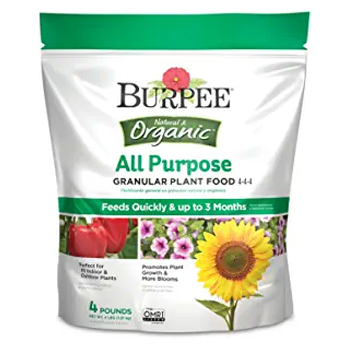 |
Check price on Amazon |
It is a top-quality fertilizer that promotes healthy growth in all types of sunflowers and other plants. This fertilizer has all-natural and organic ingredients, such as bone meal, blood meal, and feather meal.
These are rich in vital nutrients that sunflowers usually need, such as nitrogen, phosphorus, and potassium.
Furthermore, Burpee Natural Purpose Granular 4-Lb Organic Food contains essential minor nutrients, calcium, and beneficial microbes that promote healthy soil and plants.
These nutrients are quickly released upon application and provide continuous feeding for up to three months, supporting the sunflowers’ growth and development.
You can use this feed for sunflowers in both flower gardens and vegetables. One of the standout benefits of this fertilizer is that it is organic. Hence it does not contain synthetic chemicals and additives that can harm the environment or human health.
In addition, it is very easy to use, and you can find it in a 4lb bag that provides ample fertilizer for a small garden. This OMRI-listed plant food is the top choice for backyard growers who wish to promote healthy growth in their sunflowers and other plants.
How to use it?
1. Apply fertilizer during the growing season: Once the sunflowers are established and have begun to grow, apply the fertilizer as a top dressing around the base of the plants. Use approximately 1 cup of fertilizer per 10 square feet of planting area, and water thoroughly after applying.
2. Repeat as needed: For optimal growth and flowering, apply the fertilizer every 4 to 6 weeks throughout the growing season.
2. GL61100518430 Dr. Earth Organic 8 Bud & Bloom Fertilizer
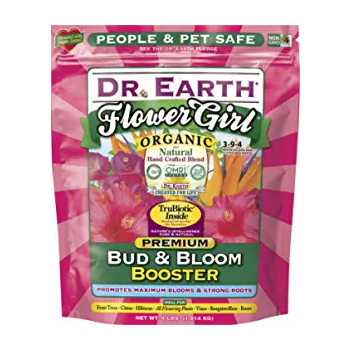 |
Check price on Amazon |
Dr. Earth is a good fertilizer for sunflowers. It is made from 100% organic and natural ingredients and formulated to nourish all kinds of rhizomes, corms, bulbs, and tubers, corms.
This plant food is a superior blend of soft rock phosphate, feather meal, fish bone meal, mined potassium sulfate, and alfalfa meal. It offers vital nutrients for the sunflowers sans any GMOs, sewage sludge, or chicken manure.
With this organic plant food, your sunflowers will be well-fed for several months. It will ensure bigger and more abundant buds and better root establishment.
Further, your blooms will maintain consistent premium quality. With a natural and stable phosphorous availability, plant growth is consistent sans any growth spikes.
In addition, this fertilizer includes beneficial soil microbes such as pro-biotics, seven champion strains, and eight select strains of endo and ecto mycorrhizae.
These components accentuate nutrient availability, boost plant performance, and amplify drought tolerance. Use it as directed on the package.
3. 51024 J R Peters Inc
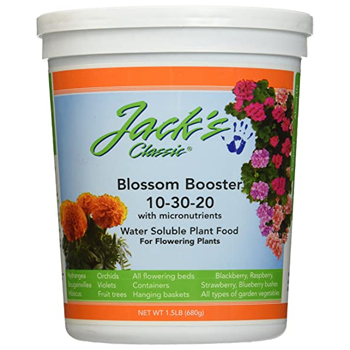 |
Check price on Amazon |
It is a water-soluble fertilizer for sunflowers with an NPK ratio of 10-30-20 and offers optimal nutrition to the sunflowers. The fertilizer has a measuring spoon and the highest safety factor, making it a superior option for feeding sunflowers.
This professional formula is designed to produce brighter colors and more flowers on all outdoor and indoor plants. It feeds the sunflowers through roots and leaves, preventing burning and promoting solid roots and green foliage.
It is the original formula with a proven 1:3:2 nutrient, making it perfect for sunflowers, vegetables, and fruits. It can also be used as a transplant solution, providing sunflowers with the necessary nutrients to thrive.
4.All-Purpose Shake ‘N Feed Miracle-Gro Plant Food
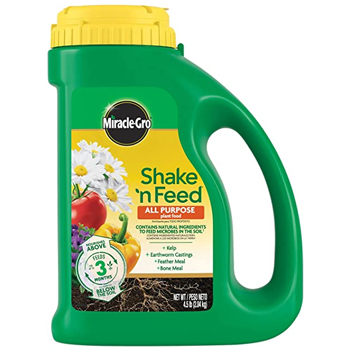 |
Check price on Amazon |
It is an all-purpose sunflower food that provides the plant with all the essential nutrients. As one of the best plant food for sunflowers, the fertilizer has natural ingredients that feed and nourish both above and below the soil.
The vital micronutrients in the fertilizer can help you achieve solid, more vibrant, and more productive plants as opposed to unfed plants. It keeps the plants well-fed for three months and does not burn them, provided you use it as directed.
You can use this fertilizer for both container gardens and ground sunflowers. It has natural ingredients that keep the nutrients in the soil fed. Further, it breaks down the nutrients and supports root development and strength.
Consequently, it increases water efficiency with sunflower’s water requirements. To achieve a beautiful all-season garden, you must reapply every three months and water regularly.
To use this fertilizer, follow the steps:
- Remove the applicator cap and peel off the seal from the jug before the first use
- Next, replace the applicator cap and flip open the spout
- Apply the fertilizer dry without pre-mixing it with water
- Do not apply it to wet foliage or stack it against the plant stem
Please do not over-apply this plant food. Ideally, you can feed ½ cup for every 10 square feet. Please ensure you evenly mix the fertilizer into the top one to three soil inches and water deeply to start feeding.
5.Organic Bone Meal Down to Earth Fertilizer
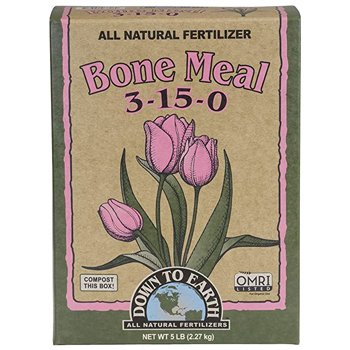 |
Check price on Amazon |
It is a top-quality organic plant food that helps promote strong flower production. Its slow-releasing granules keep the plant fed for up to four months, ensuring the sunflower gets all the vital micronutrients necessary for flowering.
It is perfect for establishing sunflower roots with its 15 percent phosphorous ratio. Regular use throughout the growth cycle ensures tall sunflowers with an impressive number of flower heads.
Despite its mild organic earthy odor, you will see no detrimental effects such as burn or chlorosis.
Using this fertilizer for sunflower’s transplants involves mixing 1-2 tbsp per hole and watering them well. You must side dress with 2-4 oz per month during the growing season for established plants.
Long-term usage of this bone meal fertilizer pays dividends compared to applying potent synthetic fertilizers.
6. All Purpose Scotts Vegetable and Flower Continuous Release Fertilizer
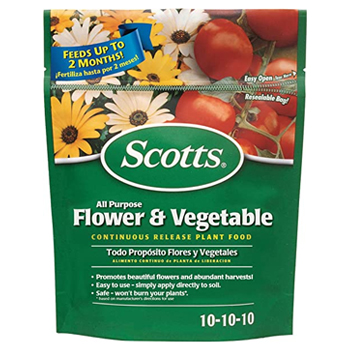 |
Check price on Amazon |
Scotts Plant food is excellent plant food to promote vigorous root growth and lush foliage for abundant harvests and beautiful flowers. It has an easy-to-apply formula. So you can directly use it on the soil.
It will feed the plants for up to two months. In addition, it is safe to use, provided you use it as directed, and it will not cause any plant burn.
To get the best results, apply the plant food every two months during the growing season, starting in the spring. Use 1 cup (9.5 oz.) for every 30 square feet or 1/2 tablespoon for every 1 square foot area.
Apply this feed evenly around plants and rake it into the top 1-3 inches of soil or mulch for direct nutrient release to the root system. Lastly, water thoroughly after application. You can find the full product instructions on the label.
7. All-Purpose Liquid Miracle-Gro Plant Food
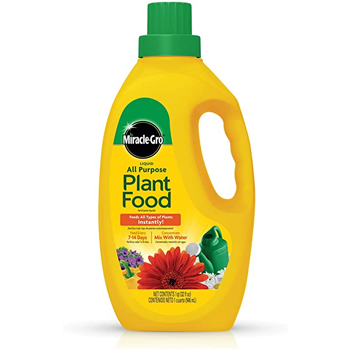 |
Check price on Amazon |
Miracle-Gro Liquid All-Purpose Plant Food is a great option to give your sunflowers the desired nutrients necessary to grow and flourish. Mix the fertilizer with water and use it to feed your plants every 7-14 days for beautiful results.
This versatile product can be used on flowers, vegetables, trees, shrubs, houseplants, and container plants, both indoors and outdoors.
To use this best liquid fertilizer for sunflowers:
- Shake the bottle well and measure the amount needed based on the area.
- Add the product to a watering can and apply it by thoroughly soaking the soil around each plant.
- For best results, please use every 7-14 days to achieve spectacular results.
Be sure to read the full product instructions on the label before use.
When Should You Fertilize Sunflowers?
Fertilization timing for the sunflower varies depending on the application method and the fertilizer type you opt for. For instance, you can apply spikes and granules to perennials and annuals during springtime.
When you have annuals, you must use a small dosage after transplanting or when seedlings have their second set of leaves.
While applying the plant food, ensure that you dig the fertilizer into the soil and avoid piling it around the base of the plant, as this could lead to fertilizer burn.
If using liquid fertilizer, please be cautious. It is more potent and should only be used when sunflowers have matured and have increased nutritional demands.
Is Coffee Grounds Good For Sunflowers?
Yes, coffee grounds can be a good choice for sunflowers as they are an excellent nitrogen source and other nutrients. Nitrogen is a nutrient that plants need to grow, and it is also a component of chlorophyll, which is crucial for photosynthesis.
However, please know that coffee grounds must only be used in moderation, as they are acidic and can lower the soil pH. Sunflowers typically thrive in a slightly acidic soil pH between 6.0 to 6.8.
Hence, if you use coffee grounds as fertilizer, mix them well with the soil and avoid adding too much to prevent the soil from becoming too acidic. You can also balance the acidity of the coffee grounds by adding some lime to the soil.
Related: Sunflower’s Lifespan
Are Any of These Homemade Fertilizers Good For Sunflowers?
Yes, these homemade fertilizers for sunflowers can be a good alternative option:
1. Chicken manure compost
Chicken manure is an excellent source of nitrogen, phosphorous, and potassium, vital nutrients for plant growth. But please compost the chicken manure first to lower the risk of burning the plants with high nitrogen levels. Once composted, you can use it as a natural sunflower food.
2. Fish emulsion fertilizer
Fish emulsion fertilizer is a liquid plant food made from fish waste. It is rich in nitrogen, phosphorus, and potassium. It is one of the best organic fertilizers, and you can use it to promote sunflower growth during the growing season.
3. Compost tea
Compost tea has compost steeped in water. It is an excellent source of nutrients for sunflowers and contains beneficial nutrients and microorganisms that help boost plant growth and soil quality. Check out these compost tea makers for home use.
4. Bone meal, horse manure, and cow manure
These are good nutrient sources. So you can use them to fertilize your sunflowers. They are rich in potassium, phosphorous, and nitrogen, essential for plant growth.
But please note you must compost these materials first to prevent nutrient imbalances and reduce the risk of disease transmission. Once composted, they make excellent natural fertilizers for sunflowers.
Related: How to grow sunflowers in a pot?
Factors to Consider When Choosing Sunflower Fertilizers
Here is a list of factors you must consider when selecting sunflower fertilizers:
1. Soil pH and nutritional deficiencies: Sunflowers thrive in well-draining soil with a pH between 6.0 and 6.8. So, before picking the fertilizer for sunflowers, you must perform a soil assessment test to know any nutrient deficiencies and the soil pH level. It can help you choose a plant food tailored to your sunflower’s needs.
2. Plant growth stage: Sunflowers have different nutritional needs at various stages of their growth. For instance, they seek more nitrogen for leaf growth during the vegetative stage.
They seek more potassium and phosphorous for seed and flower production in the flowering stage. Thus, you must select a plant food apt for the plant’s growth stage that can help optimize yield and growth.
3. Selecting between specialized and balanced picks: Balanced fertilizers contain equal amounts of nitrogen, phosphorus, and potassium, while specialized fertilizers contain higher levels of one or more nutrients.
Choosing a balanced fertilizer can provide an excellent all-around boost to sunflowers, while specialized fertilizers can target specific needs, such as promoting flower production.
Typically, sunflowers cherish a high level of phosphorous to establish solid roots and development, which enables the plants to extract nutrients from the soil.
4. Picking between spikes, liquid, water-soluble, organic, and synthetic: You can find several kinds of fertilizers, such as synthetic, organic, water-soluble, liquid, and spikes. Synthetic plant foods are chemically derived.
However, they provide a rapid boost of nutrients, whereas organic fertilizers are acquired from natural sources and offer a slow release of nutrients. Liquid and water-soluble fertilizers are easy to apply and get quickly absorbed by the plants, whereas spikes are slow-release fertilizers that can provide nutrients over an extended period.
Choosing the correct type of fertilizer depends on factors such as the plant’s needs, soil conditions, and personal preference.
